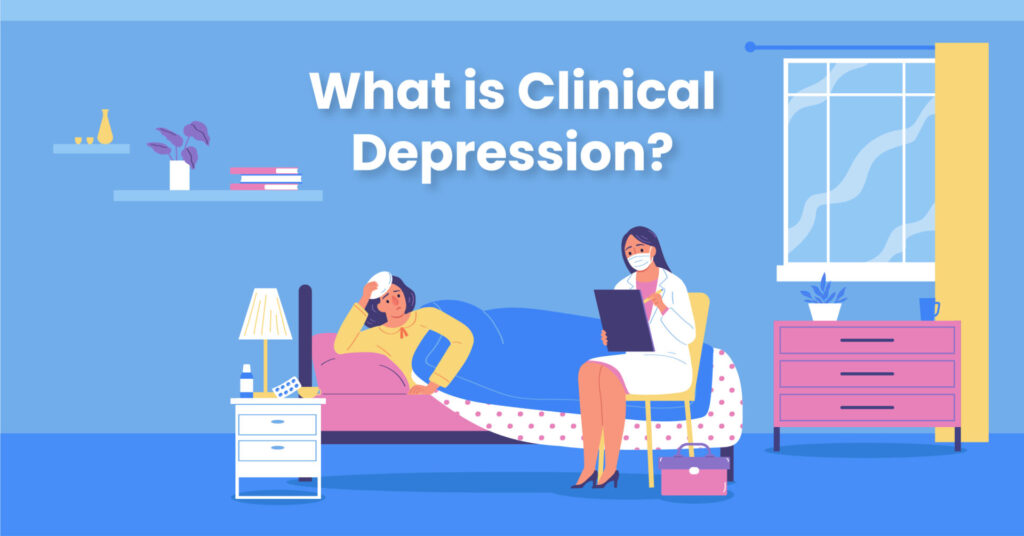Depression is a well- known term now and used very commonly, but most of the time it is misunderstood. Being sad, low, feeling lonely or crying a lot are some of the symptoms of depression for sure but there are furthermore diagnosis criterions that should be done only by a professional to be specifically labelled as depression.
Depression has a few types, and the most unknown type is Clinical Depression. It is very less talked about, mostly because people are less aware and educated about this type.
Clinical depression is the more-severe form of depression, also known as major depression or major depressive disorder. This can be explained as an intensified version of general depression. This depression can occur without any extrinsic factors like loss of a loved one, failure, or any other stressor.
Symptoms of Clinical Depression:
The symptoms of Clinical Depression do not need a life crisis to occur. Anyone can be a victim of clinical depression.
Ø A person suffering from clinical depression might experience fatigue, lack of concentration and is not able to enjoy the activities which used to be fun before. Not only that, but it also negatively affects one’s day to day life including work, social activities, communication and health.
Ø A constant sense of hopelessness and despair prevails in a person.
Ø Suppressing negative feelings can result in violent behavior towards other or self, increasing the risk of suicide, illness, homicide.
Ø Irritability and anger are seen in some which bring about a dysfunction in day to day life and interpersonal relationships get affected as well.
- Drug and alcohol abuse can be both ;a symptom as well as a cause of clinical depression and can prove as a trigger if persists.
- Sleep disturbances, including insomnia or hypersomnia may be seen.
- A person usually experiences feelings of worthlessness or guilt, and keeps fixating on past failures or self-blame.
- Another symptom which is not seen in general depression is unexplained physical problems, such as back pain or headaches
- Social withdrawal and isolation is seen in people with clinical depression. In children or young adults clinginess, poor academic performance due to lower self-confidence and self- esteem, constant worrying or crying, self sabotaging and negative self talk, extreme emotional outbursts, and increased levels of irritability and agitation are some causes of clinical depression as well.
Causes of Clinical Depression :
The causes help us better understand the symptoms and attain more clarity.
Biological causes
There are certain neurotransmitters in the human brain that influence the mood and mental state of a person and likewise reflect in behaviour and thinking. Neurotransmitters associated with clinical depression are norepinephrine, dopamine and serotonin. Norepinephrine is involved in dealing with stress while dopamine and serotonin are involved in mood and emotion one feels. Drop in the levels of these particular neurotransmitters are directly proportional to the change in one’s feelings, which results in feeling sad, irritable, angry, etc.
Genetic causes
Depression sometimes run in families, but it’s not necessarily common. There can be a partial hereditary link to depression. Parents, children, siblings of people having severe depression are more likely to have depression compared to the general population. Although, the types and severity of depression might vary in every generation.
Medical drugs and substance
Some medications which are prescribed against some pathology, might surely heal that particular area in the body but depression can be a side-effect or extreme reaction of the same. Some medications might directly affect the mood, especially in older people. Substance abuse and excessive alcohol consumption aggravates the symptoms and general depression might take a form of major depression.
Prolonged illness or injury
Chronic illness like HIV, arthritis, heavy diabetes, heart or kidney problems, might develop depression as the treatment can get overwhelming and frustrating after a long period of struggling. Similarly chronic pain gets unbearable at times and the discomfort affects a person’s abilities to sleep, exercise and function regularly. Sometimes, it also affects the interpersonal relationships, which leads to social withdrawal and isolation leading to major depression.
Treatment for Clinical Depression
Though, Clinical depression sounds like a nightmare, it is treatable with proper care and guidance of professionals in the field.
Medications falling in the category of mood stabilisers and antidepressants, especially SSRIs (Selective Serotonin Reuptake Inhibitors) are prescribed by a Psychiatrist after medically analysing the patient.
ECT (ElectroConvulsive Therapy) can also be needed in severe cases and performed strictly under the guidance of a psychiatrist.
Psychotherapies offered for treating clinical depression include talk therapy, CBT (Cognitive Behavioral Therapy) and interpersonal therapy.
Some ways to help yourself, along with the professional guidance to fight against major depression can be practising Yoga, meditation, and at least a 15 minute walk in a positive environment. Exercising and walking generates higher levels of endorphins in the body which fall in the category of happy hormones. Trying to maintain a positive approach paves the way for cure making it a successful treatment.
Alternative treatment for depression:
When it comes to depression it needs to be healed and treated systematically and depends on the incidence and prevalence of the symptoms. Although there is no substitution for psychotherapy or medications, there can be a few ways to heal from clinical depression along with the major ones. Some ways like yoga meditation, reiki practices, acupressure techniques, etc can be helpful while healing.
Curing for clinical depression requires support of closed ones, will to recover and appropriate guidance of professionals in the mental health field.
Read more :
Teen Depression: Why Do Many Teenagers Feel Depressed?
Overcoming Toxic Relationships
A Way Out Of Toxic Relationships
Psychotherapies to Treat Depression





